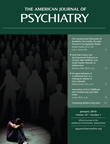Do Treatment Improvements in PTSD Severity Affect Substance Use Outcomes? A Secondary Analysis From a Randomized Clinical Trial in NIDA's Clinical Trials Network
Abstract
Objective
The purpose of the analysis was to examine the temporal course of improvement in symptoms of posttraumatic stress disorder (PTSD) and substance use disorder among women in outpatient substance abuse treatment.
Method
Participants were 353 women randomly assigned to 12 sessions of either trauma-focused or health education group treatment. PTSD and substance use assessments were conducted during treatment and posttreatment at 1 week and after 3, 6, and 12 months. A continuous Markov model was fit on four defined response categories (nonresponse, substance use response, PTSD response, or global response [improvement in both PTSD and substance use]) to investigate the temporal association between improvement in PTSD and substance use symptom severity during the study's treatment phase. A generalized linear model was applied to test this relationship over the follow-up period.
Results
Subjects exhibiting nonresponse, substance use response, or global response tended to maintain original classification; subjects exhibiting PTSD response were significantly more likely to transition to global response over time, indicating maintained PTSD improvement was associated with subsequent substance use improvement. Trauma-focused treatment was significantly more effective than health education in achieving substance use improvement, but only among those who were heavy substance users at baseline and had achieved significant PTSD reductions.
Conclusions
PTSD severity reductions were more likely to be associated with substance use improvement, with minimal evidence of substance use symptom reduction improving PTSD symptoms. Results support the self-medication model of coping with PTSD symptoms and an empirical basis for integrated interventions for improved substance use outcomes in patients with severe symptoms.



